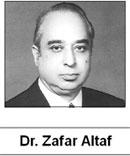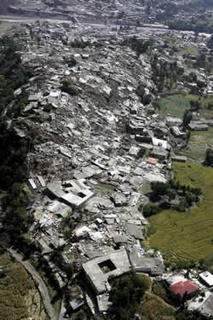Applying Nobel laureate Sen to Pakistan

Amartya Sen’s seminal work on social choices won him the Nobel prize in economics a couple of years ago. I had a chance to go to India recently and bought his recent work, The Argumentative Indian. One cannot but admire the person for his integrity and his application of the thought process to social choices and to freedom to choose. Economics is rather shy of all those non-economic factors that we intuitively know do matter. His work as an academician has a considerable amount of relevance to us in the subcontinent.
The recent tragedy made one wonder about the hows and whys of the situation. There were the Islamic relief people from the UK that managed to get to the Kashmiri population in Azad Jammu and Kashmir. Then there was our government that did not manage to get to first base, and there were those from Britain who spent their own resources to try and help the unfortunate people. Humanity does wonders, and that is what this world is all about -- not about per capita incomes and certainly not about individual resources. If that was the case, then the unfortunate in the Margalla Towers would still be alive. When tragedy comes it comes in an unswerving wave and takes everyone with it. Nature’s architecture was not demolished. Man-made architecture was demolished, and we need to ask why. Unfortunate as it may seem, it is time to reflect and to prevent any more mishap(s). The morality of it does not help.T
he press is a wonderful arena for getting to understand the absurd and the ridiculous. Was there any need for anyone to defend a particular agency for lack of action? That they moved like the proverbial Spanish Armada and that they were not prepared nor trained for the tragedy and neither were they given any rudimentary indications of what to do, meant that were seen getting off the trucks, their weapons in hand, only to add to the din that was already there. We Pakistanis like to shout at the top of our voice and be heard, and the worse the tragedy, the louder we get. Ministers came and went. King Canute came and went. The underling of King Canute lived up to his traditions and flew to oversee the area of Islamabad when he was only a few minutes away from the place.
To come back to Sen, we have to understand his stance and the choice that is to be made available to the citizens of this country. The process and the procedure are important. A worthy Senator and Minister stated that the functions performed by the valiant forces were not their responsibility. Pray, what is their responsibility? Salaried as they are by the taxpayers and the people of Pakistan, are they available only for governance? We had the recent episode of a Matriculation certificate and the battle had to go to the Supreme Court for final decision. The gentleman was my Minister and I can tell you his decision making was as good as anyone’s. Formal education was immaterial. It is these hurdles that make for ridiculous interventions in direct contravention of the freedoms that these individuals must have. Sen mentions the tyranny of the religious classes but he forgets that there are many kinds of tyrannies, and each tyranny has to be dealt with in its own context. A former Minister was likewise asked to graduate. It was immaterial that the person had been a minister umpteen times. Some of these graduates are not ministers but monsters, trafficking as ministers. Look around you and you will be able to determine.
Freedom, of which the Nobel Laureate speaks, is directly linked with choices and these choices are available to only the few and fortunate. The rest of Pakistan is in bonded slavery. Take a cue from the land acquisition law. Why should the assets of the poor be taken away at peanut prices? Why should urban land be taken away by the high and mighty for development of the country when all it is doing is making more and more people poorer every day. The beneficiaries are different from the losers. Tarbela is an excellent example, and the case of Islamabad evacuees is also a question that should expose the power structure. Examine the development efforts anywhere and go beyond the numbers. The process is anything but transparent. The procedures have been violated. The guilty are not the poor but the rich. To whom are all those trees that are logged in AJK sent? I was working in Manoor valley, off the Kaghan valley, and I found that logging was going on and none of the principles were being followed. I asked who the contractor was. I was given the name of Shah Jehan, and how appropriate. What was auctioned at less than Rs. 100 a cubic meter was being sold by the scoundrel for more than eight times that price. Who were the beneficiaries? Search and you will find. I asked the locals whether they were the beneficiaries and the answer was in the negative. The road was kacha and the bridges were made of local logged wood. Infirm and unsure. It would take the better part of the day to reach 14 miles away, where I was supposed to be working.
But what of the power structure, the rules of business, the law, constitution, and how these have been perverted? Prof. D.P. Choudhry of Delhi University, a student of Sen, talked of a wobbly democracy in India. Whether the political situation is better with a wobbly democracy or a firm and erect authority needs some circumspect inspection. The choices that his mentor talks of are not available. Gender choices are definitely not available to the unfortunate and the rape of the environment has gone on to the rape of the gender. The reforms of the police have brought out the best in us. Unfettered, unlettered and undeterred, one of them raped a young boy in, of all places, Islamabad. Where society has suffered from natural and unnatural causes, one wonders how these matters will be resolved. Is there a critical point from where there is no way out but a blow up of society? The talk rambled on to the caste systems in India and Pakistan. Do the Daliths have a choice? Do the other castes other than those in power have a choice in Pakistan? Is the tribal belt not more tuned to flexibility, despite the fact that they are continuously under fire from the powers that be? In the name of terror, in the name of saving Pakistan, and in the name of so many excuses, we are entitled to prostitute whatever social systems we had.
For the moment suffice it so say, what choices did the poor have in the tragic areas? I asked my helper what the situation in his village was and whether he had suffered any loss. He had walked 90 kilometers. He said, ‘Allah ka shukar hai’. I sensed something was wrong and asked him a specific question. He replied a sister and two of her children were buried. ‘Baqi Allah ka shukar hai.’ Did any aid reach them (this was the eighth day)? The answer came simply in the negative. He was not bemoaning his loss. He had accepted it, knowing that he will now have to slog much harder for his remaining extended family. The choice of migrating to another country is also no longer available. Yes, Mr. Sen. How to get from the comfort of an academic and to the nitty gritty of this society? Above all, how to come to terms with the tyranny of the rich and the powerful? They have their own culture and their own ways in each country.The Post





